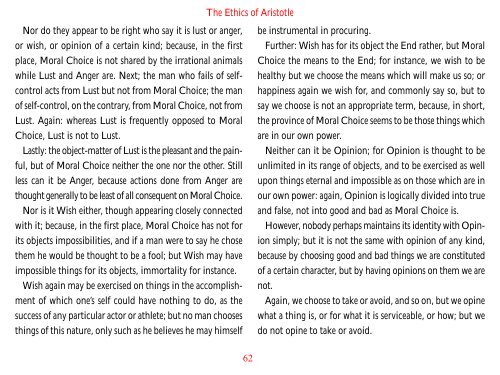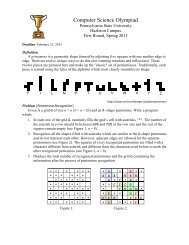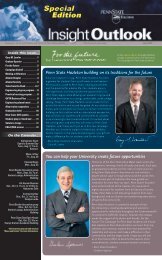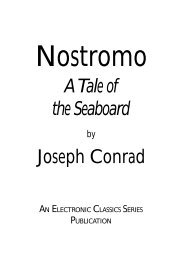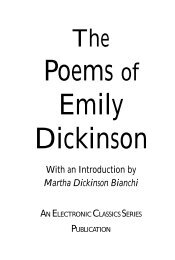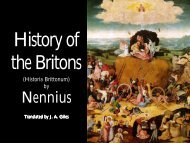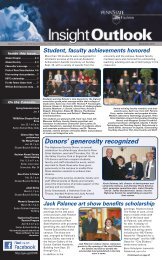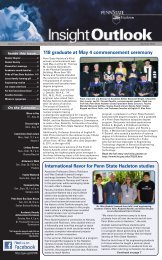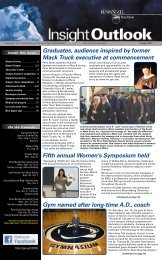- Page 2 and 3:
Informe de Yerba Mate Nº 02 | [12/
- Page 5 and 6:
The Ethics of Aristotlesure the obj
- Page 7 and 8:
The Ethics of Aristotleof conduct t
- Page 9 and 10:
The Ethics of Aristotleing,” “m
- Page 11 and 12: The Ethics of AristotleThe agent ac
- Page 13 and 14: The Ethics of Aristotleing, thinkin
- Page 15 and 16: The Ethics of Aristotleformed by di
- Page 17 and 18: The Ethics of Aristotlevalue?” Pl
- Page 19 and 20: The Ethics of Aristotleeducating hi
- Page 21 and 22: ARISTOTLE’S ETHICSBOOK IEvery art
- Page 23 and 24: The Ethics of Aristotlemuch the sam
- Page 25 and 26: The Ethics of Aristotlebecause many
- Page 27: The Ethics of AristotleBut of these
- Page 31 and 32: The Ethics of AristotleAnd we must
- Page 33 and 34: The Ethics of Aristotleerally the t
- Page 35 and 36: The Ethics of Aristotlemost prosper
- Page 37 and 38: The Ethics of Aristotlesensible bea
- Page 39 and 40: The Ethics of Aristotlebut of men a
- Page 41 and 42: The Ethics of Aristotleand fails, w
- Page 43 and 44: The Ethics of AristotleAgain, every
- Page 45 and 46: The Ethics of Aristotleonly do we b
- Page 47 and 48: The Ethics of Aristotleonly produce
- Page 49 and 50: The Ethics of Aristotlethe excellen
- Page 51 and 52: The Ethics of Aristotleselves bad,
- Page 53 and 54: The Ethics of Aristotlevirtues afte
- Page 55 and 56: The Ethics of Aristotlether from th
- Page 57 and 58: The Ethics of Aristotleis right, be
- Page 59 and 60: The Ethics of Aristotletions requir
- Page 61: The Ethics of AristotleNow since al
- Page 65 and 66: The Ethics of Aristotlean impossibi
- Page 67 and 68: The Ethics of Aristotlediscreditabl
- Page 69 and 70: The Ethics of Aristotleover this im
- Page 71 and 72: The Ethics of Aristotlecircumstance
- Page 73 and 74: The Ethics of Aristotlehis line and
- Page 75 and 76: The Ethics of Aristotlethe term Cou
- Page 77 and 78: The Ethics of AristotleIf then we m
- Page 79 and 80: The Ethics of AristotleBut men scar
- Page 81 and 82: The Ethics of Aristotlerather disli
- Page 83 and 84: The Ethics of AristotleBOOK IVIt mu
- Page 85 and 86: The Ethics of AristotleAgain, it is
- Page 87 and 88: The Ethics of Aristotlethat of rece
- Page 89 and 90: The Ethics of Aristotlerelative to
- Page 91 and 92: The Ethics of Aristotleany case wha
- Page 93 and 94: The Ethics of Aristotleobject in vi
- Page 95 and 96: The Ethics of Aristotleof humble st
- Page 97 and 98: The Ethics of Aristotlea term of co
- Page 99 and 100: The Ethics of Aristotleright or is
- Page 101 and 102: The Ethics of AristotleVIIThe mean
- Page 103 and 104: The Ethics of Aristotlerefinement.
- Page 105 and 106: The Ethics of Aristotleto youth: we
- Page 107 and 108: The Ethics of Aristotleinstrument w
- Page 109 and 110: The Ethics of AristotleIIBut the ob
- Page 111 and 112: The Ethics of Aristotlebecause the
- Page 113 and 114:
The Ethics of Aristotlethe division
- Page 115 and 116:
The Ethics of Aristotlethey defined
- Page 117 and 118:
The Ethics of Aristotlemand, as bei
- Page 119 and 120:
The Ethics of AristotleIt follows t
- Page 121 and 122:
The Ethics of Aristotlebeen embodie
- Page 123 and 124:
The Ethics of Aristotlecaused his w
- Page 125 and 126:
The Ethics of Aristotlearmour worth
- Page 127 and 128:
The Ethics of Aristotlewho cannot h
- Page 129 and 130:
The Ethics of Aristotlethat is a ce
- Page 131 and 132:
The Ethics of Aristotlebody, he wer
- Page 133 and 134:
The Ethics of AristotleSo Art, as h
- Page 135 and 136:
The Ethics of Aristotlebecause the
- Page 137 and 138:
The Ethics of Aristotlethe knowledg
- Page 139 and 140:
The Ethics of Aristotleinquiring an
- Page 141 and 142:
The Ethics of AristotleA proof of w
- Page 143 and 144:
The Ethics of Aristotle[Sidenote:11
- Page 145 and 146:
The Ethics of Aristotlein saying th
- Page 147 and 148:
The Ethics of Aristotlethem for kno
- Page 149 and 150:
The Ethics of AristotleI. That Self
- Page 151 and 152:
The Ethics of Aristotlewrong, it wo
- Page 153 and 154:
The Ethics of Aristotleit is urged
- Page 155 and 156:
The Ethics of Aristotleunder the in
- Page 157 and 158:
The Ethics of Aristotleand such as
- Page 159 and 160:
The Ethics of Aristotleperfection o
- Page 161 and 162:
The Ethics of Aristotlean inanimate
- Page 163 and 164:
The Ethics of AristotleMoreover of
- Page 165 and 166:
The Ethics of Aristotleand moral ch
- Page 167 and 168:
The Ethics of AristotleNor is the m
- Page 169 and 170:
The Ethics of Aristotlean End.This
- Page 171 and 172:
The Ethics of Aristotledom aims at.
- Page 173 and 174:
The Ethics of Aristotlein this way
- Page 175 and 176:
The Ethics of AristotleBOOK VIIIthe
- Page 177 and 178:
The Ethics of Aristotlegood or plea
- Page 179 and 180:
The Ethics of Aristotleobject and s
- Page 181 and 182:
The Ethics of Aristotlebad men may
- Page 183 and 184:
The Ethics of AristotleAnd the good
- Page 185 and 186:
The Ethics of AristotleVIIBut there
- Page 187 and 188:
The Ethics of Aristotleby the delig
- Page 189 and 190:
The Ethics of Aristotleresult from
- Page 191 and 192:
The Ethics of Aristotleship comes t
- Page 193 and 194:
The Ethics of Aristotleing, but the
- Page 195 and 196:
The Ethics of Aristotleof the other
- Page 197 and 198:
The Ethics of AristotleIn Friendshi
- Page 199 and 200:
The Ethics of AristotleBOOK IXrespe
- Page 201 and 202:
The Ethics of Aristotleanother he m
- Page 203 and 204:
The Ethics of Aristotleand all simi
- Page 205 and 206:
The Ethics of AristotleIV[Sidenote:
- Page 207 and 208:
The Ethics of AristotleNeither, in
- Page 209 and 210:
The Ethics of Aristotleit what it m
- Page 211 and 212:
The Ethics of AristotleSo then, ent
- Page 213 and 214:
The Ethics of Aristotleone another
- Page 215 and 216:
The Ethics of Aristotlelike a mere
- Page 217 and 218:
The Ethics of Aristotlemany acquain
- Page 219 and 220:
The Ethics of Aristotleif he is gif
- Page 221 and 222:
The Ethics of AristotleBOOK Xthey m
- Page 223 and 224:
The Ethics of Aristotledependable:
- Page 225 and 226:
The Ethics of Aristotlesweet, or bi
- Page 227 and 228:
The Ethics of Aristotlekind of “w
- Page 229 and 230:
The Ethics of Aristotlecians who ta
- Page 231 and 232:
The Ethics of AristotleNow in all s
- Page 233 and 234:
The Ethics of Aristotlethought to b
- Page 235 and 236:
The Ethics of Aristotlethought to e
- Page 237 and 238:
The Ethics of Aristotlelative philo
- Page 239 and 240:
The Ethics of Aristotlethe Gods, an
- Page 241 and 242:
The Ethics of Aristotlemean, either
- Page 243 and 244:
The Ethics of Aristotlether write n
- Page 245 and 246:
The Ethics of Aristotlefield. Greek
- Page 247 and 248:
The Ethics of Aristotlein habits, e
- Page 249 and 250:
The Ethics of Aristotlethat externa
- Page 251 and 252:
The Ethics of Aristotle[Greek: akol
- Page 253 and 254:
The Ethics of AristotleP. 36, l. 3.
- Page 255 and 256:
The Ethics of Aristotlewhich of rig
- Page 257 and 258:
The Ethics of Aristotleing at or af
- Page 259 and 260:
The Ethics of Aristotlehas two sens
- Page 261 and 262:
The Ethics of Aristotlecommerce all
- Page 263 and 264:
The Ethics of Aristotlejured but to
- Page 265 and 266:
The Ethics of Aristotlea branch of
- Page 267 and 268:
The Ethics of Aristotleexist indepe
- Page 269 and 270:
The Ethics of AristotleP. 143,1 27.
- Page 271 and 272:
The Ethics of AristotleP. 147, l. 1
- Page 273 and 274:
The Ethics of AristotleP. 165, l. 4
- Page 275 and 276:
The Ethics of Aristotlekai ta loipa
- Page 277:
The Ethics of Aristotlea happy aggr


